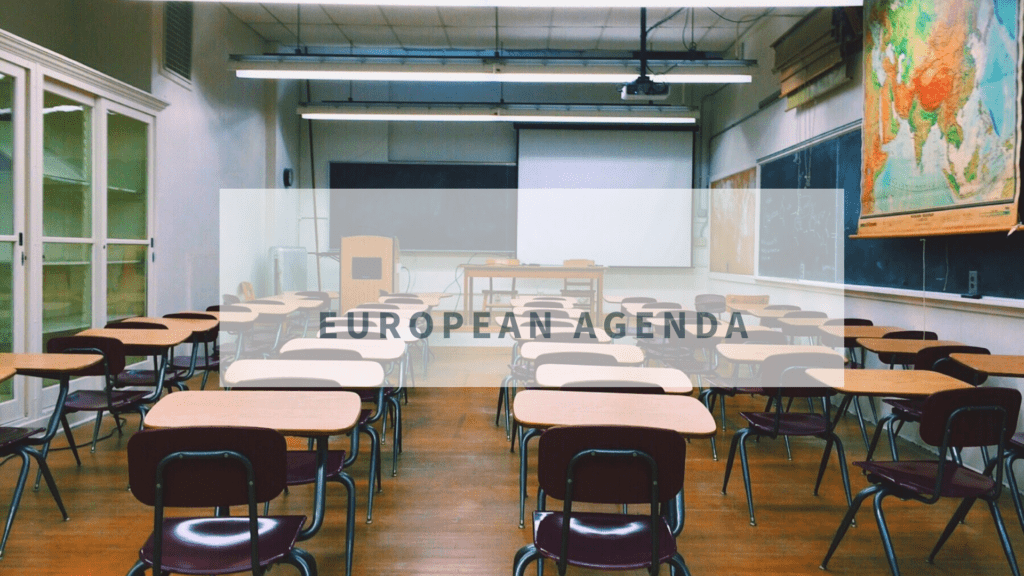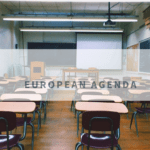The European Union, through its various institutions and agencies, continues to propose support measures in the field of culture and education, focusing on the well-being of Europeans and increased educational opportunities throughout the Member states. These days the focus has been on digitalization and the budget for education and culture.
To this effect, we point out below significant events in this agenda:
| INSTITUTIONS | MEETINGS/DATE | |
| European Parliament |
13 July 2021 | 13 July 2021 |
| European Council |
29 Noviember 2021 | 30 November 2021 |
[toc]
18-June :CULT Committee will debate over ways to improve European citizenship education
Citizenship education gives people the knowledge and skills to understand, challenge and engage with democratic society including politics, the media, civil society, the economy and the law. The importance and need for active European citizenship education was the focus of discussions during the public hearing, on 27 May, organized by the CULT Committee and entitled “The status of European citizen’s education and possible avenues forward to strengthen civic and democratic education”.
More information:
18-June : Launch of the new Erasmus+ programme 2021-2027
Erasmus+ is the EU’s programme to support education, training, youth and sport in Europe. The New Erasmus+ has an estimated budget of €26.2 billion. This is nearly double the funding compared to its predecessor programme (2014-2020).
The 2021-2027 programme places a strong focus on social inclusion, the green and digital transitions, and promoting young people’s participation in democratic life.
It supports priorities and activities set out in the European Education Area, Digital Education Action Plan and the European Skills Agenda. The programme also supports the European Pillar of Social Rights, backs European cooperation in education and training, implements the EU Youth Strategy 2019-2027 and develops the European dimension in sport.
The Commission has just launched the new Erasmus+ programme 2021-2027. The programme offers a wide range of opportunities for study periods abroad, traineeships, apprenticeships, and staff exchanges in all fields of education, training, youth and sport.
The programme contains interesting developments for young people such as the integration of DiscoverEU – a unique initiative for 18 years olds to discover Europe.
The programme will also support new youth participation activities to get involved in democratic life highlighting shared European values and fundamental rights.
The key pillars of the new Erasmus+ 2021-2027 programme are:
- Inclusive Erasmus+: bringing enhanced opportunities to people with fewer opportunities, including people with diverse cultural, social and economic backgrounds, and people living in rural and remote areas.
- Digital Erasmus+: providing high-quality digital training and exchanges to reinforce digital skills.
- Green Erasmus+: promoting sustainable means of transport in line with the European Green Deal and raising awareness of environmental issues.
More information :
15 -16 June, European Commission: Erasmus+ at the European Development Days (EDD) 2021
Focus
On 15 and 16 June, the European Commission celebrated the European Development Days (EDD). This year the event took place in virtual format, and focused on “The Green Deal for a Sustainable Future”.
The Erasmus+ Programme featured prominently on a stand in the EDD Global Village, next to the EU programmes on Research and Innovation. The stand presented the international dimension of Erasmus+ and its role in supporting the development of knowledge, skills and attitudes on climate change and sustainable development within the European Union and beyond.
Participants
The EDDs gathered 4,500 organisations, 154 countries and more than 66,000 participants. It brings the development community together each year to share ideas and experiences in ways that inspire new partnerships and innovative solutions to the world’s most pressing challenges.
More information
European Commission :Erasmus Days 2020
European Commission: Coronavirus response
15- June, Eurydice-European Commission: What has the covid-19 crisis taught us about learning and teaching in higher education?
“Pedagogy is the driver, technology is the accelerator.” Michael Fullan
The rapid transition from face-to-face to distance learning and school closures due to the global health crisis have massively affected all levels of education including higher education. According to UNESCO’s global monitoring of covid-19 impact on education, about 84% of learners – from pre-primary to tertiary education level – were affected in March and April 2020. Today, in mid 2021, there are still about 174 million learners currently studying remotely as a result of the pandemic. In the academic world, online learning had been in place since much before the outbreak of the covid-19 pandemic, but used with much less intensity. Have we learned how to improve online learning during the pandemic?
At a time when the student experience hugely depends on technology, learning technology advisors (LTAs) have been playing a crucial role in some systems. Eurydice interviewed Learning Technology Advisor Christina Perouli who works in the Centre for Excellence in Learning and Teaching at the University of East London. Her responsibilities include training and mentoring university teaching staff in learning technologies and learning design.
What is the role of the Learning Technology Advisors?
To begin with, it would be good to point out that specific job titles may vary from one institution to another – ‘learning technologists’, ‘technology enhanced learning specialists’, ‘e-learning coordinators’, ‘digital learning designers’ etc. But whatever the title they all do many things: providing consultancy, front-line support, bespoke training, contributing to research and generally leading on projects that blend sound pedagogy with cutting-edge technologies.
How have you been supporting university staff & students to adapt to the new reality and reach their full potential?
I think everyone would agree that the transition from face-to-face to online and/or blended learning was a steep learning curve for both university staff and students. The pandemic forced the global academic community to explore new ways of teaching and learning as face-to-face classes were closed. These new ways include the HyFlex format which combines the terms ‘hybrid’ and ‘flexible’. Synonymous terms are ‘dual’ and ‘multi delivery mode’. These formats provide students with the flexibility to decide how they wish to attend their classes and engage with material in the mode that works best for them; either in person, synchronously online, and/or asynchronously online. A HyFlex, dual or multi delivery mode makes class sessions and materials available so that students can access them online or in person, during or after class sessions.
In order to make this transition smoother, we created a self-paced blended learning course to upskill our staff in the first months of the online pivoting. Alternative assessment, principles of learning design, and technology-enabled systems were only some of the sections included.
We provided the academic staff with self-paced learning opportunities regarding tools and teaching online, alongside more team-focused activities. Specifically, we offered intensive webinars for teams of academic staff and departments, daily drop-in sessions that did not require prior registration, and any kind of guidance either in a video format or as an interactive pdf and infographic. A SharePoint page was also set up with all the latest updates and top tips to include everything under one roof, a ‘’one-stop shop’’ to eliminate confusion and save time.
We provided our students with separate training opportunities on how to support their fellow students with some basic digital skills when needed. Some of our students were trained to act as ‘’digital first aiders’’ to assist their fellow students, and especially mature students, with essential digital skills such as using Office365, accessing e-books and many more.
Were all student and staff needs properly considered during this process of rapid change?
In the rush to cope with the shift online, the needs of students with disabilities could easily have been overlooked. However, synergies between universities and professionals in the vision, hearing and other fields have played a crucial role in providing accessible learning materials to students with disabilities and mitigating the impact of the sharp online shift. Beyond any doubt, there is still a lot of work to be done on the accessibility of online learning materials and it should be one of the top priorities of the higher education sector.
What were the main challenges throughout the online pivoting? How have you dealt with these challenges?
Everyone learned quickly about the challenges of remote learning. Staff found it difficult to motivate and engage their students online, often feeling that they were teaching in a void with cameras off and no visual feedback.
Meanwhile, many students suffered from lack of laptops and poor bandwidth, as well as a difficulty in concentrating on teaching that had not been sufficiently adapted for the online environment. On top of this, staff and students alike were dealing as parents with home schooling, and many lacked the digital skills that were now essential.
How did universities respond to the shortage of laptops?
Many universities generously offered laptops to students and staff, alongside an offer of constant training and support. We work with lecturers, and keep adding interactivity to the courses as we try to increase students’ engagement. The creation of Communities of Practice (CoP) allowed peer-learning practices and activities to take place. CoP have many faces and started by sharing best practices via Microsoft Teams channels, and continued with fostering ‘’buddy’’ systems and ‘’critical’ friends” from either the same or different departments. ‘Learning lunches’ was another safe place for people to exchange their views on what works best. These actions facilitated collective reflection and saved considerable time in people’s heavy schedules.
What was the main impact of the online shift on higher education institutions?
The online shift has definitely revealed weaknesses and strengths in the higher education sector. Among other things, it has highlighted the vital importance of a legal requirement of accessible online learning materials, including higher and further education institutions. This obligation ensures that digital content, delivery systems and technologies are accessible for students with disabilities.
Many lecturers used to be relatively skeptical to work with education technology specialists, feeling that they already had the expertise and knowledge to work autonomously and independently. However, teaching is all about teamwork, and the global health crisis has shown that the uneasy bonds between academic staff and education technology specialists needed to be strengthened. Academic staff and education technology specialists have built up trust in each other through facing common challenges and sharing their expertise. I am very confident that this will give us the opportunity to improve the quality of teaching and learning in a post-pandemic era.
More information
11-Jun, European Economic and Social Committee: #TheFutureIsYours: The EESC consultations on the CoFoE will reach every corner of Europe
The president of the European Economic and Social Committee (EESC), Christa Schweng kicked off the Committee’s official activities relating to the Conference on the Future of Europe (CoFoE) with a live question and answer debate. #CoFoE – Bringing the European project back to citizens took place on Thursday 10 June and set out organised civil society’s views and expectations regarding the Conference. It also highlighted the importance of engaging with people outside the Brussels bubble and brainstormed in preparation for the coming citizens’ consultations.
EESC president Christa Schweng opened the event and said that the Committee will conduct outreach initiatives in all Member States so as to guarantee fair representativeness: We will involve employers, workers and the whole of organised civil society and convey their points of view to the Conference on the Future of Europe
. She also referred to the recently adopted EESC resolution on the new narrative for Europe. Let’s make Europe a truly great place to be and prosper, a guardian of shared fundamental values, a global promoter of sustainability, open and fair trade and multilateralism, a haven for a unique economic and social model and a driver of sustainable prosperity. We must and will take this opportunity to bring the European project back to its core owners: its people
.
The Conference plans to have its conclusions ready by the spring of 2022 and the EU institutions will reflect on what Europeans have been saying.
The EESC’s resolution on the Conference reflects your strong commitment to ensuring that it delivers for citizens. I appreciate how important the governance of the Conference is for you and your explicit reference to defining the scope and purpose of citizen and civil society engagement
, concluded Dubravka Šuica.
The EESC’s work on a new narrative for Europe was led by the three group presidents: Stefano Mallia of the Employers Group, Oliver Röpke of the Workers Group and Séamus Boland of the Diversity Europe Group.
Sustainable economic recovery, skills and innovation are priorities for the Employers Group, as Stefano Mallia pointed out when that panel opened. The Conference on the Future of Europe offers us the unique opportunity to engage in a constructive discussion and to rally around a common vision, just as previous generations did. That still holds true today as we consider our future and as we move from coal and steel to a carbon-free and digital economy. If we want the EU to deliver prosperity and enhance the well-being of our societies, we need to look back and start with our foundations
. Mr Mallia also stressed the need to lose no time in finalising the Single Market and embark on the twin green and digital transitions.
More information:
17 – May , European Council: Education, Youth, Culture and Sport Council
Education and Youth,
- Equity, inclusion and success in education and training for all
Equity in access, inclusion and success for all are basic principles of education and training. However, equity and inclusion are still a challenge for our educational systems, with significant differences within and between member states. As the socio-economic background remains an important factor influencing educational outcomes in the European Union, the Council approved conclusions on this topic. The number of underachievers and early school leavers is still high in the EU. 20.3% of those with disabilities leave education early. Students with fewer opportunities have lower expectations of completing tertiary education (43.4%) than their peers (82.3%). The conclusions call on member states and the Commission to work together on policies to reduce low-achievement, raise competence levels and prevent unemployment.
- European Universities initiative
Ministers approved conclusions on the European Universities initiative. The European Universities initiative is a fundamental pillar of the European Education Area to be built by 2025. The Council invites member states to use all available funding mechanisms to support the initiative and recommends more cooperation between education authorities, higher education institutions and stakeholders in order to remove obstacles to cooperation at European level, bearing in mind that the European Universities can be instrumental in building important bridges with their research and challenge-based learning and teaching approaches, creating stronger synergies between the higher education dimension of the European Education Area, the European Research Area and the European Higher Education Area.
- Evolving scenarios for the transformation of EU higher education
Following up on the Council conclusions on the European Universities initiative, ministers held a public policy debate to hear opinions and exchange ideas on the future of higher education and, in particular, on the role of higher education institutions as drivers of change towards the digital and green transitions. The debate was framed by three questions: whether European Universities’ alliances should be ‘testbeds’ for interoperability and cooperation between member states regarding European research and teaching career development; what specific measures member states are prepared to take to promote a European approach to quality assurance for joint degrees; and whether they are considering adopting national legislation allowing for micro-credentials in higher education.
- Participation of young people in decision-making processes
Even though young people are very active in democratic life, they often have fewer opportunities to participate and are underrepresented in decision-making. As they are affected by the whole political agenda, their engagement and involvement in finding responses to today’s challenges are essential.
Today the Council approved conclusions on strengthening multi-level governance when promoting the participation of young people in decision-making processes. The aim of these conclusions is to ensure that all young people have equal opportunities for participation, involvement and empowerment in relevant decision-making processes.
More information
European Council : Education, Youth, Culture and Sport Council, 17-18 May 2021
May 18, European Council: Culture, Audiovisual and Sport
- Recovery, resilience and sustainability of the cultural and creative sectors
Culture plays a crucial role for the European identity and has an important social and economic impact. The Council has approved conclusions which restate that the cultural and creative sectors are among the hardest hit by the COVID-19 pandemic and that there is a need to take decisive policy actions in their support, both as an immediate response and as a more ambitious and far-sighted approach, as the current crisis has exposed some structural challenges and pre-existing vulnerabilities of the cultural and creative sectors. In order to promote the recovery, resilience and sustainability of the cultural and creative sectors, the conclusions identify six priorities, namely: improving access to available funding; enhancing the resilience of professionals in the cultural and creative sectors; further strengthening mobility and cooperation; expediting the digital and green transitions; improving knowledge and preparedness for future challenges; and taking cultural scenes and local communities into account. The Council conclusions also aim to promote fairness and equality for all, giving special attention to the situation of female artists and cultural professionals. The Council calls on member states and the Commission to exchange views on best practices and to take stock of these conclusions in 2023.
- Europe’s Media in the Digital Decade
The Council has approved conclusions to support the recovery and transformation of the European news media and audiovisual sectors. As both sectors have incurred massive losses because of the COVID-19 pandemic, member states are invited to take advantage of the Recovery and Resilience Facility, which is the EU’s post-crisis financial instrument, and to invest in the acceleration of the digital transformation and green transition of these sectors.
- Sport diplomacy
Sport diplomacy is a relatively new concept at EU level. At the same time, sport has always been used to convey political messages and is part of the diplomatic toolkit of the EU’s global counterparts. EU ministers discussed whether the EU’s cultural and educational diplomacy offers a blueprint for the development of an EU sport diplomacy strategy and what the next steps should be in this regard.
Other business
- The presidency reported on the current impact of COVID-19 on sport
- The upcoming Slovenian presidency presented its work programmes for culture/audiovisual affairs and sport
- The presidency reported on the presidency conferences on culture and the media
- The EU member state representative of the incumbent trio presidency on the WADA Foundation Board informed ministers about the WADA Executive Committee and Foundation Board meeting
- The Spanish delegation addressed the impact of video-on-demand (VOD) platforms on the EU’s audiovisual market, in particular on the relationship between the various actors in the value chain
- The German delegation provided information on the culture policy perspective in the negotiations amending the VAT Directive, especially considering taxation of the art trade
- The Slovenian delegation reported on the designation of the European Capital of Culture for 2025
- The Commission provided information on the HealthyLifestyle4All initiative which is planned to be launched in September 2021
More information
European Council conclusions: Recovery and transformation of Europe’s media
7 May European Council: Porto Social Summit
Main results
EU leaders, European institutions, social partners and civil society representatives met in Porto to reinforce their commitment to the implementation of the European Pillar of Social Rights.
At the high-level conference organised by the Portuguese presidency in the context of the Porto Social Summit, they discussed how to set the European social policy agenda for the next decade and ensure that we face the challenges of the present and of the future leaving no one behind.
The discussions revolved around three main areas:
- work and employment
- skills and innovation
- welfare state and social protection
At the end of the conference, EU institutions, European social partners and civil society representatives co-signed the Porto Social Commitment.
- Porto Social Commitment (Portuguese presidency website, 7 May 2021)
- Porto Social Summit: all partners commit to 2030 social targets (Portuguese presidency press release, 7 May 2021)
The results of the high-level conference will inform the work of the informal meeting of heads of state or government on 8 May.
Background
The EU proclaimed the European Pillar of Social Rights in 2017. The pillar sets out 20 key principles that guide us towards a strong social Europe that is fair, inclusive and full of opportunity in the 21st century.
In March 2021, the European Commission presented an action plan for the implementation of the European Pillar of Social Rights. The action plan proposes a number of initiatives and sets three main targets to be achieved throughout Europe by 2030:
- an employment rate of at least 78% in the European Union
- at least 60% of adults attending training courses every year
- reducing the number of people at risk of social exclusion or poverty by at least 15 million people, including 5 million children
More information:
Recommended Bibliography
Transformation post-COVID : The future of European universities
Towards gender equality in the cultural and creative sectors
Publicaciones de la UE Towards a European education : Critical perspectives on challenges ahead
Education and youth in post-COVID-19. Europe Crisis effects and policy recommendations







Leave a Reply